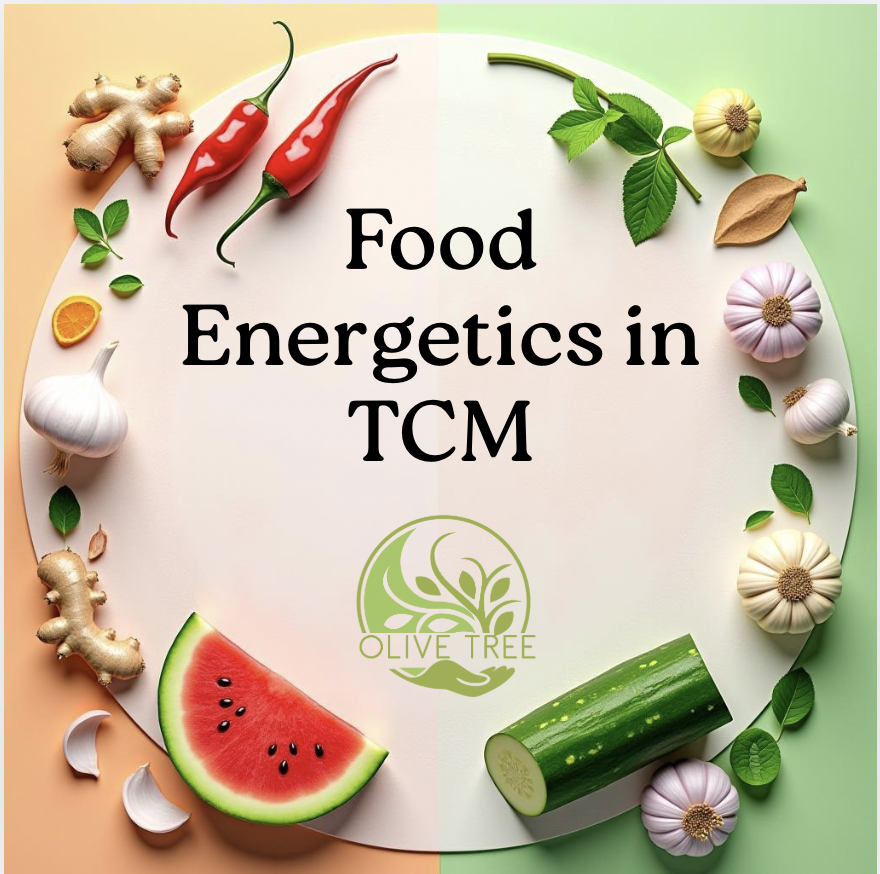Food Energetics in Chinese Medicine: A Gentle Guide
At Olive Tree, I love helping you tune into your body’s needs — and that includes understanding the energetic qualities of the food you eat. In Traditional Chinese Medicine (TCM), food isn’t just fuel. It plays a vital role in balancing your energy (Qi), supporting digestion, calming inflammation, and helping you feel grounded and nourished.
This approach is less about calories or macros, and more about how food feels in the body and how it supports your internal balance.
Warming vs Cooling Foods: Listening to What Your Body Needs
Some foods naturally cool and calm the body, easing heat, inflammation, and emotional restlessness. Others are warming and energising, helping you feel stronger, more centred, and more resilient when energy is low or digestion feels weak.
Cooling (Yin) Foods
Cooling foods are ideal when the body shows signs of heat or excess energy:
Helpful for:
- Night sweats
- Irritability or anxious feelings
- Skin flare-ups or redness
- Dry, inflamed sensations (eyes, throat)
Examples: cucumber, lettuce, celery, watermelon, green tea, mung beans, peppermint
How to Use: Include these foods gently in warmer weather, or when you’re feeling emotionally or physically overheated. They’re especiallyhelpful during perimenopause, after illness, or if sleep is disrupted by heat.
Warming (Yang) Foods
These foods build internal warmth and help your energy flow more smoothly.
Helpful for:
- Cold hands and feet
- Fatigue or sluggish digestion
- Low mood or motivation
- Feeling heavy, tired or mentally foggy
Examples: ginger, lamb, cinnamon, garlic, oats, leeks, chicken, miso
How to Use: Perfect in autumn or winter, or when you feel tired and depleted. Think soups, stews, warming spices and slow-cooked meals.
Olive Tree Tip: It’s not about cutting out cooling foods forever — just gently shifting toward what feels supportive for your body right now.
Thermal Nature of Foods: Not What It Seems
In TCM, foods are also classified by their thermal nature — how they influence the body’s internal temperature. This isn’t about whether your meal is served hot or cold, but rather its effect on your energy system.
Cold Nature
Examples: watermelon, peppermint, raw spinach, iced drinks
Effect: Strongly cooling and clearing
Use for: Heat, inflammation, or feverish sensations
Cool Nature
Examples: tofu, celery, courgette
Effect: Gently detoxifying, mildly cooling
Use for: Mild internal heat, skin sensitivity, or emotional irritability
Neutral Nature
Examples: rice, chicken, carrots, potatoes
Effect: Nourishing, stabilising
Use for: Everyday support and gentle rebalancing
Warm Nature
Examples: oats, onions, leeks, cinnamon
Effect: Strengthens digestion and circulation
Use for: Feeling cold, tired, or mentally low
Hot Nature
Examples: lamb, chilli, alcohol, fried foods
Effect: Intensely warming
Use for: Deep cold or severe sluggishness (used cautiously)
What Flavour Tells Us
Each flavour in TCM corresponds with a particular organ and energetic function. Paying attention to what you crave (or dislike) can offer clues about your internal balance.
Sweet
Organs: Spleen & Stomach
Effect: Nourishes, supports digestion, and calms the system
Examples: rice, carrots, sweet potato, dates
When to include: After illness, when feeling weak, tired or frazzled
Sour
Organs: Liver & Gallbladder
Effect: Grounds emotions, preserves fluids
Examples: lemon, vinegar, plum, sauerkraut
When to include: Feeling tense, overwhelmed, or emotionally reactive
Bitter
Organs: Heart & Small Intestine
Effect: Clears heat, dries dampness
Examples: rocket, dandelion, kale, coffee
When to include: Hot flushes, skin flare-ups, excess mucus or bloating
Pungent
Organs: Lung & Large Intestine
Effect: Moves Qi, opens the chest, clears stagnation
Examples: garlic, onion, ginger, chilli
When to include: Feeling blocked, sluggish, or coming down with a cold
Salty
Organs: Kidney & Bladder
Effect: Anchors energy, supports bones, replenishes minerals
Examples: miso, seaweed, mineral salts
When to include: Exhaustion, brain fog, low back weakness
Final Thoughts from Olive Tree
Food is a beautiful way to bring your body back into rhythm. You don’t need to overhaul your diet — just begin by noticing how different foods make you feel.
A cooling salad might be just right in summer, but a warm bowl of porridge with ginger could be the comfort your body needs in winter.
Let your food choices reflect your internal landscape, your season of life, and what feels nourishing right now.
Because when food meets intention, it becomes medicine.
Enjoy your food,
Sarah x




